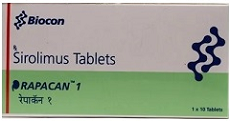7 Things to Know about Immunosuppressants
Rapacan 1mg Tablet
 Patients in the last stage of renal disease undergo a kidney transplant, which is the most effective treatment process to improve survival and quality of life. Immunosuppressant drugs such as Rapacan 1mg Tablet combined with long-term care should be taken both during and after the organ transplantation. Here are the following seven things to know about immunosuppressants.
Patients in the last stage of renal disease undergo a kidney transplant, which is the most effective treatment process to improve survival and quality of life. Immunosuppressant drugs such as Rapacan 1mg Tablet combined with long-term care should be taken both during and after the organ transplantation. Here are the following seven things to know about immunosuppressants.
- What are immunosuppressants?
Immunosuppressants are medicines or drugs that lower the ability of the body to reject a newly transplanted organ. Immunosuppressants are also known as anti-rejection drugs, and there are two kinds of immunosuppressants available:
- Induction Drugs
Induction drugs are strong anti-rejection medicines that are given to patients at the time of organ transplantation.
- Maintenance Drug
Maintenance drugs are anti-rejection medications that are for the long term. There are four main classes of maintenance drugs such as the following.
– Antiproliferative agents
– Calcineurin inhibitors
– Steroids
– MTOR inhibitors
- What are the uses of immunosuppressants?
When patients undergo kidney transplantation, their body tries to attack the new organ by damaging or destroying it since the body knows that the new organ is foreign and not an original part of the body. Rapacan 1mg is an immunosuppressant drug that helps suppress the body’s ability to destroy or damage the new kidney. The main goal of Rapacan 1mg tablet is to prevent damage or rejection of the newly transplanted organ. You can learn about the rapacan 1mg price and other benefits by contacting your local pharmacy.
- Does everyone who undergoes a new kidney transplantation need to take an immunosuppressant?
Everyone who has undergone organ transplantation must take these drugs. In case your new organ comes from an identical twin, you need not take them. Missing even one dose of an immunosuppressant would cause organ rejection. Unless your healthcare team doctor advises you to skip a dose, you should not miss any dose.
- What should you do in case you miss a dose?
In case you miss a dose, you should call your doctor immediately. If it is time to take the next dose, avoid taking a double dose.
- Does taking an immunosuppressant cause any side effects?
There are a few side effects of taking immunosuppressants, such as the chance of causing infection, a burning sensation at the time of passing urine, cold or cough, fever, etc. Another common side effect of taking immunosuppressants is stomach upset. The side effects will be higher in the earlier period of organ effects of the drugs will be higher. After six months of organ transplantation, the dosage of the immunosuppressant gets lower, and so the chances of side effects tend to be low.
- How are immunosuppressant drugs administered?
Immunosuppressant drugs are available only with a doctor’s prescription. These drugs are administered as capsules, injections, liquids, and tablets. Immunosuppressant therapy aims to find a way to prevent the rejection of a newly transplanted organ and have fewer side effects. A patient taking these drugs must regularly intake them in the exact way prescribed. Even a slight change in the drug regimen will trigger organ rejection.
- Are there any symptoms or signs that you must watch for?
Although you take immunosuppressant drugs such as Rapacan 1mg regularly, you can still develop the risk of rejecting the newly transplanted organ. Following are the signs or symptoms that you must watch for and call your healthcare provider immediately:
– Bloody urine
– High fever
– Tenderness around your new kidney
– Weight gain
– Flu-like feeling
Successful and long-term kidney transplantation would require regular follow-up and regular blood tests.




 :
:  +91 – 9999064250 | 9811604444 | 9811604424
+91 – 9999064250 | 9811604444 | 9811604424


